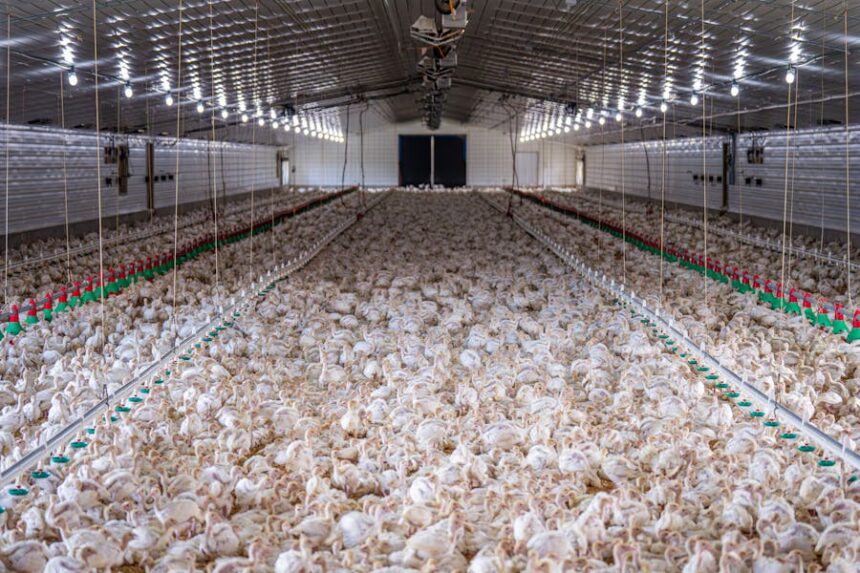Raising chickens on a large farm can be a bit of a balancing act, can’t it? Hundreds, maybe thousands, of birds, and trying to keep all of them in tip-top shape sometimes seems impossible. But when you think about it, keeping chickens in perfect condition is not rocket science. It is all about setting up the right environment, giving them the right care, and a little bit of room to roam. Now, let’s go directly to some easy-to-follow tips that will help keep your flock healthy and happy, even on a large scale.
Give Them Space and Fresh Air
Imagine being stuck in a room with no breathing space, huh? Well, chickens feel the same way. One of the first steps toward creating a healthy environment on a large farm is giving your birds enough room to spread their wings—literally. Overcrowding leads to stress, and a stressed chicken is not going to lay eggs or grow as it needs to. On the other hand, spacious housing can be complemented with proper ventilation. Good airflow cools the place down and diminishes harmful gases like ammonia that can build up. Nobody wants chickens breathing in foul air all day. Proper ventilation reduces moisture too, which can cause respiratory issues if not kept at bay. A little extra room and fresh air can do wonders for the overall health and productivity of your flock.
Keep Them Comfortable Year-Round
Think about it: if you’re too hot or too cold, you’re not going to function at your best, are you? Chickens aren’t either. Keeping the temperature of their housing “just right” no matter the season is important. You would want heating systems when the weather is cold, but once summer starts to set in, it’s all about keeping things cool with open windows or cooling fans. It is a delicate balance, but if pulled off well, it may spell the difference between your chicken’s good health and productivity. This is where automatic climate control systems can help in regulating temperature without having to be changed every other moment. By controlling the climate, you will find a decrease in health problems and improved egg production throughout the year.
Cleanliness Is Next to Chicken-ness
Let’s face it—nobody likes to live in a dirty environment, and your chickens are no exception. On larger farms, waste control is an issue but also a highly necessary one, as clean coops and bedding mean fewer diseases, which means healthier birds. Create a system where excrement is regularly cleared out of the coop, through automated processes or just due to an organized cleaning schedule. The cleaner, the happier your chickens will be. This also cuts down on parasites and flies that can spread disease with ease. Make a regular cleaning schedule in the first place to save time and trouble later.
Let Them Roam a Bit
Even on the largest of farms, chickens like to stretch their legs and take in a little fresh air. Access to the outdoors can work wonders for the health of chickens. This is where different mobile solutions come into play, such as prefabricated chicken tractors. These nifty tools let you move chickens around to fresh patches of pasture so they always have access to fresh grass while helping to prevent overgrazing. It’s a win-win—your chickens get a change of view, and your land stays in good condition. Let’s not forget that aside from evening out the manure in the field, it reduces soil compaction. Happy chickens that can run around in space are healthier and more content so that spells better production for the farm.
Feeding: It’s All About Balance
Of course, you will not thrive on a poor diet, and neither will your chickens. Feeding them a balanced diet, and making sure they constantly have food available, is particularly important for large farms. At times, you may feel that tossing some feed out and calling it a day is sufficient, but scheduled feeding times have much better results in growth and egg production. Automated feeders will also help make sure that everyone gets a fair share without the fuss and stress of crowding around one spot. Simple yet effective. Of course, next to the feed comes fresh water, as hydration should not be ignored. Cleaning feeding and watering areas will also prevent diseases caused by contaminants.
Watch Out for Their Health
Chickens aren’t exactly going to tell you when they’re in bad shape, so it is up to you to watch out for your hens. For them to be disease-free, regular check-ups on their health and vaccinations should be done to avoid outbreaks, which spread like wildfire in huge flocks. Moreover, it would also include limiting access to the farm or even using disinfectant footbaths to help your chickens avoid external threats. But most importantly, early detection of problems means you can prevent those diseases from infecting the whole flock. Working closely with a vet allows you to come up with a health plan mapped out for the needs of a specific farm.
Don’t Forget the Fun Stuff
Who says chickens can’t have fun? Providing enrichment, such as perches, dust baths, and even just a bit of space to scratch around, can make a world of difference. These little things keep chickens active and reduce stress. And less stress is the path to better health and productivity. It really doesn’t take much to make their environment a little more interesting, and you’ll see the benefits almost immediately. Bored chickens are more likely to peck at each other or become aggressive, so enrichment helps prevent behavioral problems. Besides, this way, you will be creating a natural environment where the birds get to express their innate behavior.
Wrapping It Up
All said and done, allowing for ideal conditions for your chickens really comes down to giving them what they want: room, comfort, cleanliness, and a bit of fresh air. Whether you are raising 500 birds or 5,000, that just doesn’t change. And with a few smart tools, such as chicken tractors, you can ensure a truly happy, healthy, and productive flock. So, are you ready to give your chickens the best environment they can live in? It’s all about finding the balance—a few conscious steps and voila! You’re well on your way to a thriving farm. Pay attention to the little things, and you’ll be certain to see healthier birds and improved productivity in no time.




